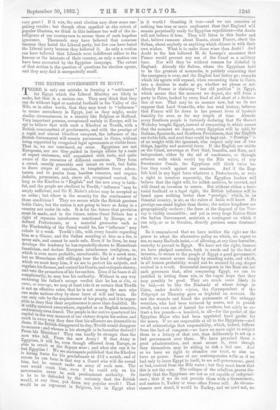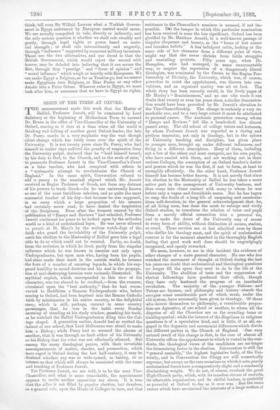THE BRITISH GOVERNMENT IN EGYPT.
THERE is only one mistake in framing a " settlement " for Egypt which the Liberal Ministry are likely to make but that is a serious one. They may think that they can do without legal or material foothold in the Valley of the Nile, or in other words, that they may trust to " influence " to secure ascendancy in Egypt, just as they might, under similar circumstances, in a country like Belgium or Holland. Very important persons, accustomed mainly to Europe, will be apt to believe that with such a Khedive as Tewfik, with a British commandant of gendarmerie, and with the prestige of a rapid and almost bloodless conquest, the influence of the British Government will remain paramount in Cairo, without being supported by recognised legal agreements or visible force. That is, we are convinced, an error. Egyptians are not Europeans, nor are they guided in foreign affairs by a caste of expert statesmen, well acquainted with facts, and quite aware of the resources of different countries. They form a crowd, usually peaceable and intent on work, but liable to fierce surges of emotion, to temptations from adven- turers, and to panics from baseless rumours, and require definite, permanent, and, above all, recognised control. So long as the Khedive is "English" and the new army is faith- ful, and the people are obedient to Tewfik," influence" may be amply sufficient, and Sir E. Malet's advice may be accepted as an order ; but where is the security for the continuance of those conditions ? They are secure while the British garrison holds Cairo, but the nation is not going to leave an Army in a country not under its rule. It is for the future that provision must be made, and in the future, unless Great Britain has a right of separate interference sanctioned by Europe, or a defined Protectorate, or a material guarantee such as the Wardenship of the Canal would be, her "influence" may exhale in a week. Tewfik's life, with every fanatic regarding him as a Giaour, and the Sultan scowling at him as a foe, is never safe, and cannot be made safe. Even if he lives, he may develope the tendency he has repeatedly shown to Mussulman fanaticism, and declare European interference irreligious, or, which is even more probable, unendurable. He is a meek man, but no Mussulman will willingly bear the kind of tutelage in which we must keep him, if we are to protect his subjects, and regulate his finance, and control his Courts, and extirpate slavery, and veto the promotion of his favourities. Even if he bears it all complacently, he may lose his authority. Without in any way endorsing his father's savage verdict that he has ni ale, ni occur, ni courage, we may at least take it as certain that Tewfik is not an effective ruler, that he is not among the men who can make nations obey by sheer force of will and brain. He can only rule by the acquiescence of his people, and it is impos- sible to deny that their acquiescence is more than doubtful. He is coldly received everywhere, regarded as an English nominee, and scarcely even feared. The people in the native quarters of his capital in the very moment of our victory despise his orders, and mark in every way they dare that his alliances are detestable to them. If the British disappeared to-day, Tewfik would disappear t _oor-morro w ; and whence is his strength to be hereafter derived? From his Minist1 They can hardly be stronger than the men who fell. From the new Army? If that Army is
TM
Egyptian, it will be, even though officered from Europe, as able tgoy Egyptian? w.o e svaol t a sth see epoys were ; and what else can it be but Eis hiring Swiss for h• statements published that the Khedive course he can form in that thgendarmerie at £12 a month, and of
at way, a Guard who will die round him, but he cannot make an army of such men The cost would crush him, even if he could rely On his mercenaries never to seek predominant authority. Or is he to be defended by the certainty that the British would, at any time, put down any popular revolt ? That would be an argument in Belgium, but in Egypt what is it worth ? Granting it true—and we can conceive of nothing less true or more unpleasant than that England will remain perpetually ready for Egyptian expeditions—the Arabs will not believe it true. They will listen to this leader and that, believe rumours about Russia, about France, about the Sultan, about anybody or anything which chimes in with their own wishes. What is to make them wiser than Arabi ? And Arabi to the last believed M. de Lesseps's assurance that France would prevent any use of the Canal as a military
base. Nor will they be without reasons for disbelief in England. Already the Sultan, whom the Egyptians hold to be the greatest of monarchs, is publicly remarking that the emergency is over, and the English had better go; remarks which his agents will expand, when recounting them in Cairo, into a decision to make us go, whether we please or not. Already France is claiming "her old position" in Egypt, which means that the moment we depart, she will form a party in Cairo, backed by every kind of aid short of a declara- tion of war. That may be no menace now, but we do not suppose that Lord Granville, who has read history, believes that France will lie down in her present fever of hysteric timidity for ever, or for any length of time. Already every Southern people is furiously declaring that Sir Garnet Wolseley bought Egypt, instead of conquering it; which means, that the moment we depart, every Egyptian will be told, lay Italians, Spaniards, and Southern Frenchmen, that the English are feeble folk, and next time could be kept out. " Prestige" is of no weight with the ignorant, who respect only one of two things, legality and material force. If the English are visible on the Canal, sovereign at Port Said, Ismailia, and Suez, and independent, either by the aid of condensers, or through artesian wells which would tap the Nile water, of any Sweetwater Canals, the Egyptians will think twice be- fore they revolt against our nominee. And if the Eng- lish hold in any legal form whatever a Protectorate, or even a right to interfere separately, the Egyptian leaders will believe that the right will, for selfish motives, be exerted, and will dread an invasion to annex. But without either a terii- torial foothold or a legal right, the British influence will be based upon nothing better than "prestige," which, in an Oriental country, is air, as the rulers of India well know. No prestige can stand higher than theirs ; the native kingdoms are geographically enclaves ; the force at the disposal of the Vice- roy is visibly irresistible ; and yet in every large Native State. the Indian Government maintain a contingent on which it can rely, or as in Gwalior, directly garrison some dominant fort.
Be it remembered that we have neither the right nor the. power to adopt the alternative policy on which, we regret to see, so many Radicals insist,—of allowing, at any time hereafter, anarchy to prevail in Egypt. We have not the right, because we have pledged ourselves, both in words and by the fact of invasion, to secure to the people of Egypt a good government, which we cannot secure simply by standing aside, and which, in all human probability, would not be secured by any despot evolved in a revolt. Successful insurgents in the East are not such governors that, after conquering Egypt, we can be justified in letting them win, in the vague hope that they may possibly be good. They are much more likely to be bad,—to be like the Bimbashi of whose doings in Cairo, under Arabia re'gium, the Correspondent of the Telegraph on Thursday gave so frightful an account. He saw the wounds and heard the statements of the unhappy wretches, who had been tortured by scores, not to punish revolt, not even out of hatred for revolters, but solely to ex- tract a few pounds—a hundred, in all—for the pocket of the Egyptian Major who had been appointed head gaoler fur the nonce. If we are responsible at all to the Egyptians—and we all acknowledge that responsibility, which, indeed, follows from the fact of conquest—we have no more right to subject them to a lottery of that sort, than deliberately to sot up a bad government over them. We have premised them a, good administration, and must secure it, even though they themselves may be willing to risk a bad one. And as we have no right to abandon our trust, so also we have no power. Some of our contemporaries write as if we had only to leave Egypt to itself, to see self-government, good or bad, evolved from the Nile water ; but they must know that this is not the case. The collapse of the rebellion proves dis- tinctly that the Egyptians are not as yet capable of independ- ence; that if we do not provide them with a Government, and sustain it, Turkey or some other Power will. As circurn- stances now stand, it would be Turkey, and we need not, we
think, tell even Sir Wilfrid Lawson what a Turkish Govern- ment in Egypt unfettered by European control would mean. • We are morally compelled to rule, directly or indirectly, and the only serious question is whether we shall rule steadily and • gently, through legal rights or power based on mate- rial strength ; or shall rule intermittently and ungently, through " influence " supported by recurrent military invasions. 'Those are the two alternatives, and our dread is that the British Government, which would reject the second with horror, may be deluded into believing that it can secure the first, through that " prestige " and "force of opinion" and. "moral influence" which weigh so heavily with Europeans. We can make Egypt a Belgium, as far as Treaties go, but we cannot make Egyptians into Belgians, or Riaz Pasha or any other Asiatic into a Frhe Orban. Whoever rules in Egypt, we must look after him, or announce that we have in Egypt no rights.



































 Previous page
Previous page